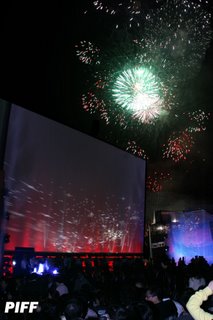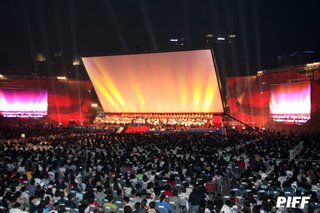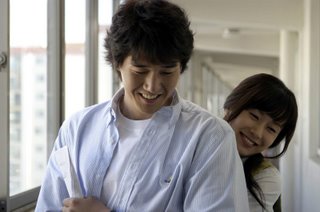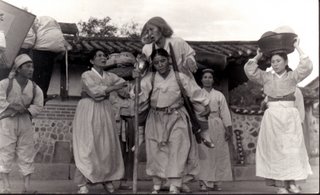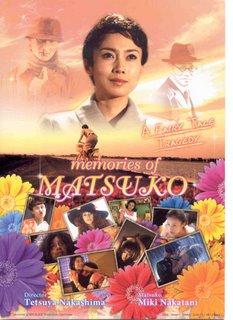UPDATE: Hah! My story has already been linked… to a Pro-North Korean website. If you are in South Korea, where that website is blocked, you can Google to read a cached version.
www.minjok.com/english/news.php3?code=2244
Contributing to the disparity was that I wrote far too much — I was asked for 1,000 words, but I gave them 1,400. Both papers needed to cut, but each chose to cut very different material. The NYT cut the quotes I had by people who had been to North Korea, but were not really part of the movie. Whereas the IHT left those quotes and instead cut the part about Dresnok rebutting the charges made by fellow defector Robert Jenkins.
Hey, just for fun, here is the original story that I wrote, in case anyone is curious. Kinds of interesting to see how different editors tackle the same material.
BUSAN, South Korea – Even at 64 years old and in failing health, James Dresnok projects an imposing figure. Six-foot-five with a huge frame and giant jowls, he speaks into the camera with a firm but distinct southern accent. Metal teeth glint as he talks. “I will give you the truth. I’ve never told anyone before,” says James Dresnok – former soldier, defector, and for the past 44 years resident of Pyongyang, North Korea.
Dresnok’s tale lies at the center of Daniel Gordon’s latest documentary, “Crossing the Line,” along with the stories of three other American defectors who crossed the 2.5-mile, landmine-strewn demilitarized zone into North Korea. Consider it the anti-Shawshank Redemption.
The documentary is Mr. Gordon’s third surprising look inside the usually secretive Democratic Peoples Republic of Korea. The first, “The Game of Their Lives” looked at the 1966 World Cup soccer team that defeated the Italians and made it, against all odds, to the Cup’s quarter-finals. Then “A State of Mind” followed two young girls participating in the North’s overwhelming mass games.
The soccer-mad director met his co-producer, Nick Bonner, in 1997 while researching the North Korean soccer team. The always-exuberant and mischievous Mr. Bonner has been working with North Korea from out of Beijing for 14 years as the director of Koryo Tours. “Game of Their Lives” made Gordon and Bonner minor celebrities in North Korea, and with each film they have used that goodwill to delve deeper into mysterious nation. “We have taken an apolitical viewpoint, with interviews from both sides of the spectrum,” wrote Mr. Gordon in an email. “Our previous films have been shown both in North and South Korea and worldwide – we take this as a significant acceptance of their neutrality.”
But “Crossing the Line,” which had its world premiere Monday night at the Pusan International Film Festival, explores much more political and controversial territory. Bonner and Gordon have received incredible access to people and places in North Korea, more with each movie. “This was the story that we thought we could never tell,” said Mr. Bonner, over Korean makgeolli after the premiere. “But we said to the North Koreans, if someone does not make this film soon, you won’t ever have any record.”
Dresnok was born poor in Norfolk, Virginia in 1941, but his parent split up when he was 9, and soon after his father abandoned him. Dresnok ended up bouncing through a series of foster homes, and on his 17th birthday, he enlisted in the Army. When he returned from a two-year stint in Germany, he found his wife had taken a lover and wanted a divorce. Feeling abandoned yet again, Dresnok was crushed. Even now, decades later, the memory is one of two times in the film that he cries. “I’m just thankful we never had any kids, because I swore I would never leave my children,” he said as he broke down.
Soon after, Dresnok re-enlisted, this time was assigned to South Korea, but now his bitterness had turned him into a hell-raiser, spending all of his money on prostitutes and drinking. “I was fed up. If I died or I lived, I didn’t care.” On noon, August 15, 1962, with a court martial looming, Private 1st Class James Dresnok picked up the 12-gauge shotgun he was cleaning and, wearing his fatigues, walked across the DMZ in broad daylight.
Once in the North, Dresnok joined Private Larry Allen Abshier, who had defected three months earlier. In December 1963, Spc. 4 Jerry Wayne Parrish also defected, and then Sgt. Charles Robert Jenkins in January 1965. Together, the four became propaganda heroes for the North and major headaches for the US government.
After a couple of years in North Korea, though, the cultural problems had grown too great, so in 1966 the four fled to the Soviet embassy in Pyongyang, asking for asylum. But the Russians just turned them over to the North Koreans. Dresnok braced for some horrible punishment – but, he says, none came. They were just ordered to undergo more education. Finally, Dresnok decided he would try to fit in. “Goddamn it, I’m going to learn their way of life,” he said. “Man is the master of his life, and little by little I became to understand the Korean people.”
By 1974, Dresnok was considered rehabilitated, and was granted North Korean citizenship. He married an Eastern European woman and had two children. After that wife passed away, he remarried and has another son. He started appearing in propaganda films in 1978 with “Nameless Heroes,” and acted in over a dozen films over the next decade. Many North Koreans to this day call him “Mr. Arthur,” after a character he played in one film.
Jenkins is now North Korea’s headache, and Dresnok could barely contain his disgust when talking about him. Jenkins left North Korea in 2004, giving a series of high-profile interviews about the wretched life he endured in his four decades there – Dresnok vehemently denies all of Jenkins accusations, calling him a liar and bore, and implying with a grin that Jenkins had impotence problems. As for Jenkins’ claim that Dresnok used to beat him sadistically, Dresnok responds that they once got in a fight, but there were only two punches: “I hit him and he hit the ground.” After a few minutes, though, the visibly agitated Dresnok asks to change the subject. “The more I think about him, the more I get the ass.”
Dresnok certainly sounds like a true believer in the North Korean system. “I wouldn’t trade it for nuthin’,” he states emphatically. He takes great pride in that two of his three sons attend the prestigious Foreign Language School in Pyongyang, saying he never could have afforded that in the United States. “I don’t want my sons to be an illiterate old man like me,” he says. But Dresnok is a celebrity in North Korea, and Pyongyang, although it is poor by Western standards, is still the city of the elite. “Yeah, anyone living in Pyongyang is privileged,” said Mr. Bonner. “But the main force behind us was human interest.”
“Crossing the Line” is not the only North Korean offering on hand at this year’s Pusan festival. “Comrades in Dreams,” by German filmmaker Uli Gaulke, looked at movie projectionists in North Korea, as well as the United States, India and Burkina Faso. “I was frustrated by the small number of images in the media about North Korea,” Mr. Gaulke said. “I wanted to create a real figure, a flesh-and-blood person, in contrast to all the usual images of North Koreans.” Perhaps he did too good of a job, because when Mr. Gaulke showed his film to North Korean officials three weeks ago they did not like it. “They said that allowing me to shoot the movie was a bad idea. I took that as a compliment.”
Often, even harder than getting access to North Korea is maintaining that access over time. “You have to respect that their beliefs are important to them,” said Michael vanderZweet, a Canadian who has traveled to North Korea several times, including six months working for the Global Aid Network. “If you live there, you go out drinking with people, you build trust, you build relationships. You cannot help but built relationships.”
Relationships are perhaps the key to why Dresnok and the other American defectors built their lives in North Korea. Three of the four American defectors (save Jenkins) came from broken homes, with missing or abusive fathers. Instead, they made homes in the most extreme totalitarian father-state in the world, a country that has turned Confucian family values into a national ideology, with Kim Il Sung the ultimate father figure. Dresnok’s father might have abandoned him, but he found Kim Il Sung and a country that never would. Even though Dresnok now suffers from numerous health problems (mostly related to his smoking and drinking, which he refuses to stop), the North Korean government continues to provide for him and his family.
Which leads into just the second time Dresnok breaks down in the film. While talking about the North Korean famines of the 1990s, Dresnok says that despite the hundreds of thousands who died, the North Koreans never cut his rations. “Why? Why do they let their own people starve to death to feed an American?” Dresnok asks as he tears up. “The Great Leader has given us a special solicitude. The government is going to take care of me until my dying day.”
— Mark Russell
